What language do they speak in Belgium?
If you ask the average person in the street that question, if they know anything at all, they’ll probably tell you that people there speak French and Flemish – which is basically correct.
However, if you dig below the surface, you’ll quickly realise that there’s a lot more to it than just this.
So in this post, I discuss the linguistic situation in the country and how it took shape as I answer the question, what language do they speak in Belgium?
Pro Tip
By the way, if you want to learn French fast, my top recommendation is French Uncovered which teaches you through StoryLearning®.
With French Uncovered, you’ll use my unique StoryLearning® method to learn French through story…not rules. It’s as fun as it is effective. If you’re ready to get started, click here for a 7-day FREE trial.
Table of Contents
Languages In Belgium – An Overview
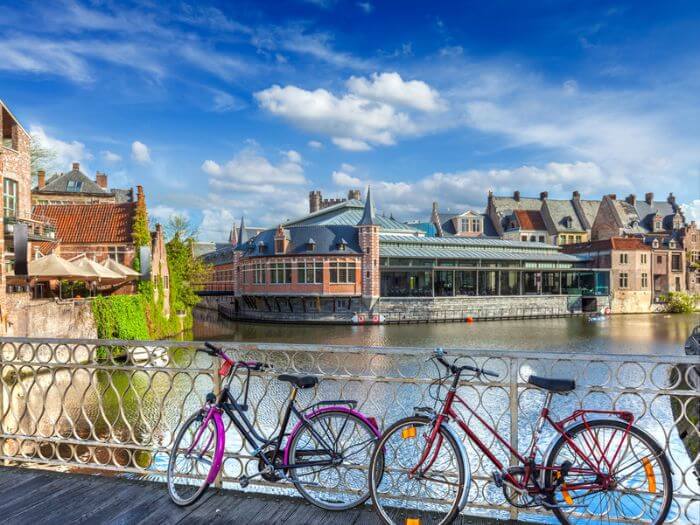
Let’s start with a brief overview of languages spoken in Belgium today.
Belgium is a country with a population of around 11 million, and most of the population speaks either Dutch or French. Belgian Dutch is often referred to as Flemish, which is why you may have heard this term – something I’ll touch on again later in this post.
Most of the Dutch speakers reside in the north, the part called Flanders. A large proportion of the French speakers, on the other hand, live in the south, the part known as Wallonia.
Both Dutch and French are considered official languages. There is also a small pocket of German speakers in the southeast, and German is recognised as the country’s third official language.
In terms of numbers of speakers and percentages, Dutch is the most commonly spoken language. Around 60% of the population – over 6.2 million people – speak Dutch as their first language.
French is the second most common language and is spoken by around 40% of the population, which equates to over 4 million speakers. The German-speaking population is much smaller, totalling only around 70,000 speakers and making up less than 1% of the overall population.
Beyond this, an array of local languages and dialects are spoken. In the north, these are mostly languages and dialects related to Dutch while in the south, languages and dialects related to French are prevalent.
Brussels, the capital, lies in the Dutch-speaking part of the country but is officially bilingual. Historically, people there spoke Dutch, but in more recent times, French has become more widespread – although both languages are frequently encountered.
So to summarise, people in Belgium mostly speak Dutch in the north and French in the south, alongside a much smaller pocket of native German speakers in the southeast.
But how did this situation arise? Let’s delve into this question next.
A Brief Linguistic History Of Belgium
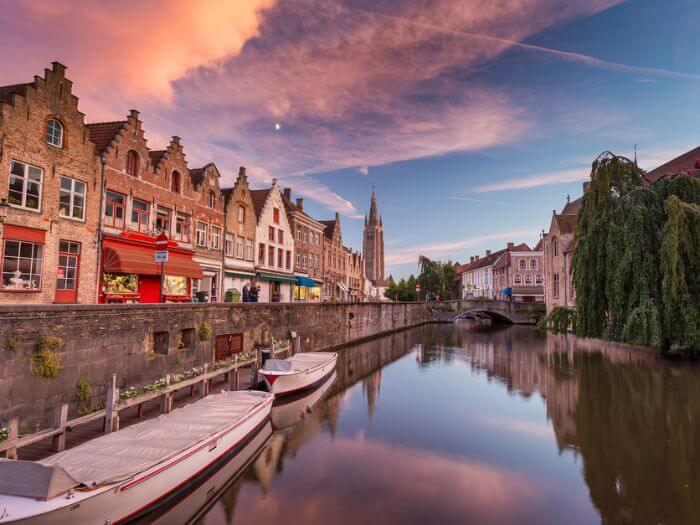
From the Romans to the Carolingian Empire
When the Western Roman Empire fell in 472 CE, people throughout the empire primarily spoke Vulgar Latin, a common, colloquial form of the classical language.
However, in the region of what’s now modern Belgium, the edge of the empire gave way to the lands of the Franks, a group of tribes speaking dialects of a Germanic language.
With the fall of the empire, the Franks took advantage of the turmoil and surged into Western Europe.
By the early sixth century, the Frankish Merovingian kings had captured most of Roman Gaul, unifying the Frankish tribes along with much of the Romanised population in the process.
Later, the Merovingians were superseded by another Frankish group, the Carolingians – whose most famous king, Charlemagne, was crowned in 800.
Under the influence of the Frankish language, the Vulgar Latin spoken in what is now modern France developed into Old French. This new language was eventually adopted by the Frankish rulers themselves as their own language fell out of use.
This Frankish influence accounts for many of the Germanic features found in modern French that are absent in other Romance languages like Spanish or Portuguese – for example, the obligatory use of subject pronouns in French.
Meanwhile, however, back in the lands where the Franks had come from, people still spoke Frankish languages. Over time, one set of dialects crystallised into what’s now known as Old Dutch, a language that would eventually yield modern Dutch.
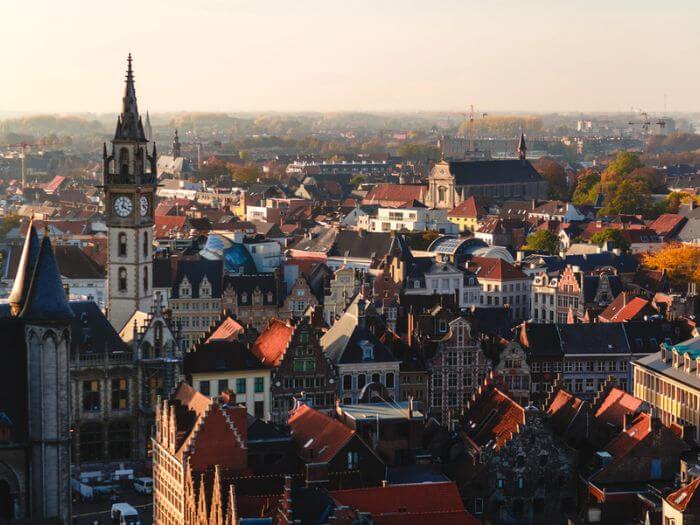
From Charlemagne to the present day
After the death of Charlemagne and a subsequent period of civil war, his former empire was divided into three parts, each ruled by one of his sons.
Following this, the valuable lands that comprise modern Belgium were fought over and divided up many times by various powers in a thousand-year tug-of-war.
After the French Revolution, France annexed the entirety of the Low Countries – but the 1830 Belgian Revolution then saw the Southern Provinces separate from the Netherlands, resulting in the creation of modern Belgium.
At the time, since the Belgian ruling class were French speakers, the language of Belgium was officially French.
However, Dutch had always been the language of a large proportion of the populace, and since then, Dutch has regained the ascendancy in the northern half of the country, being granted official recognition in 1898.
Meanwhile, French still dominates in the southern area adjacent to France.
Then, in the final act that determined Belgium’s current linguistic landscape, during the First World War, Germany invaded Belgium.
As a result, when the war was over, the Prussian districts of Eupen and Malmedy were ceded to Belgium, which accounts for the pocket of German speakers living there today.
By the way, if you're into the origins of French, you'll enjoy my post on French language history.
Now let’s look a bit closer at these languages as they are spoken in Belgium.
How Does Belgian French Differ From Standard French?
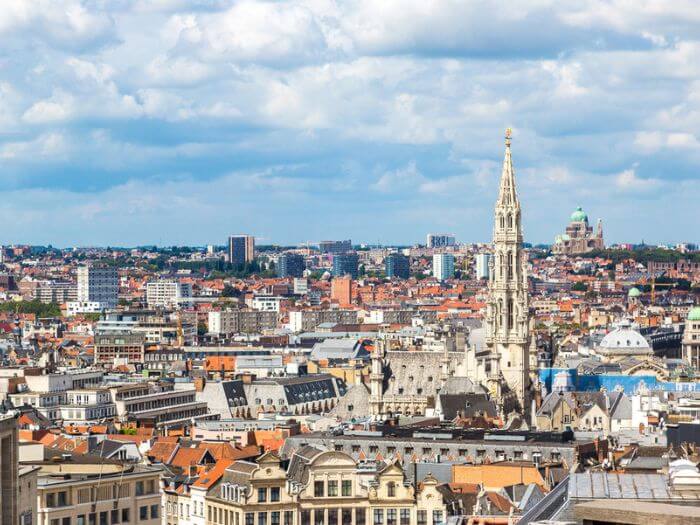
The main dialect of French spoken in Belgium is known as Belgian French; it is sometimes also known as Walloon French, named after Wallonia, the southern half of Belgium where it’s spoken.
Standard Belgian French is extremely close to the standard French of France, with which it is almost 100% mutually intelligible.
Differences are most noticeable in Belgian vocabulary, with some Belgian words being considered archaic in standard French.
Belgian French also has quite a few loanwords from Dutch – as well as from other French and Dutch dialects spoken in Belgium – and French speakers from elsewhere might not be familiar with some of these.
There are also some slight differences in pronunciation, but the differences between standard French and Belgian French are minor.
They are usually no greater than the differences in pronunciation between regional French accents. And they are usually far less noticeable than the differences between, for example, the French spoken in Paris and the French spoken in Marseille or the Pyrenees.
In addition to differences in vocabulary and pronunciation, there are also a few minor differences in grammar and syntax.
However, as a non-native speaker, unless you have reached a fairly advanced level, you might not even be able to detect much of a difference at all.
And if you can understand a speaker from Paris, you will be able to understand standard Belgian French without any trouble.
Here are just a couple of examples of the kind of differences you might encounter:
- Numbers
One of the most famous differences between standard French and Belgian French is how Belgians say 70 and 90.
If you speak French, you have probably remarked that the French have a seemingly perverse way of saying these numbers. 70 is soixante-dix and 90 is quatre-vingt-dix – which literally translate as “sixty-ten” and “four-twenty-ten” respectively.
As a result, you may have wondered why the French don’t have more reasonable words for these numbers and have opted to make up these clunky and slightly bizarre terms.
However, in Belgium, this is not something you’ll have to worry about because the Belgians use the words septante and nonante instead – as do the French-speaking Swiss.
The Swiss also use the word huitante for 80 instead of quatre-vingts (literally “four-twenties”), but you won’t hear this in Belgium. However, in Brussels, you will hear octante in its place, just to confuse things further!
Interestingly, at one time, these words were also heard in France – but they have long since fallen out of use. Check out my post on French numbers for more about counting in French and talking about numbers.
- Une fois
If you ever hear a French person making fun of Belgians and their accent, they will invariably add the expression une fois (once) to the end of every sentence – incorrectly, as it turns out.
Many Belgians, especially in Brussels, do use this phrase, but it is usually placed in the middle of the sentence – it comes from a direct translation of the Dutch eens, meaning “once”, which is used to soften a sentence or turn it into a suggestion.
- Goûter
The word goûter in French means “to taste”, but in standard French, it is only used in the sense of “to try” or “to sample”, as in j’ai envie de le goûter (I want to taste it) – however, in Belgium, it can also be used in other ways.
For example, reflecting the Dutch expression Das smaakt, Belgians will often say ça me goûte to say they like the taste of something.
It’s the equivalent of the French expression ça me plaît (literally, “it pleases me”), but unlike the French version, this Belgian expression can only be used when talking about food.
Belgians may also use goûter in the sense of a food having a certain flavour, similar to the other use of “to taste” in English.
For example, Belgians will happily say something like ça goûte la pomme (it tastes of apple) – which, in standard French, is not possible.
Thanks to a Belgian friend of mine, I have now incorporated this into my own French lexicon.
At first, this was just to make fun of her, but now I use it simply because I like it and because it’s a convenient way of speaking – although French speakers from France probably find it a bit weird!
- Que novel?
A simple example of the slightly different expressions you might come across in Belgium – this one means “what’s new?”, and it’s the equivalent of the standard French quoi de neuf?
Belgian Dutch
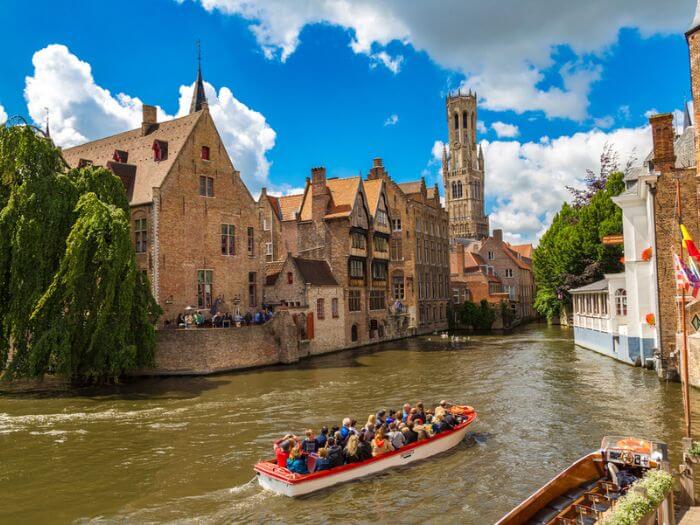
The differences between the Dutch spoken in Belgium and the Dutch of the Netherlands broadly mirror the differences between the French of Belgium and that of France.
The two are almost completely mutually intelligible, and while a number of differences in terms of vocabulary and grammar exist, these are not enough to pose significant problems of communication between a Dutch speaker from the Netherlands and one from Belgium.
As you might expect, one difference is that Belgian Dutch has many loanwords from French.
However, perhaps more surprising is that Netherlands Dutch also has its own set of French loanwords, many of which are not used in Belgium.
Instead, when it comes to coining new words, Belgian Dutch often prefers to combine existing Dutch words to create new ones rather than borrowing from French.
The linguistic situation is complicated further by the fact that not just one but many versions of Dutch are spoken in Belgium – as they are in the Netherlands.
In higher registers, Belgian Dutch and standard Netherlands Dutch are at their most similar. However, in more colloquial registers, differences appear, and the language splits into a number of distinct but closely related dialects.
Between the highest register and the local dialects, there is also an intermediate form of speech known as Tussentaal, which is based on the various dialects of Flanders.
Tussentaal is a relatively recent development, and it currently appears to be undergoing a process of standardisation. It also appears to be gaining in popularity throughout the country, especially with the middle classes.
In Belgium, as in the Netherlands, Dutch is known officially as Nederlands.
However, standard Dutch in Belgium is also sometimes referred to as Vlaams, which is the equivalent of “Flemish” in English or flamand in French. The word “Flemish” is also sometimes used to include the other non-standard dialects of Belgian Dutch along with Tussentaal.

Other Languages And Dialects Spoken In Belgium
As if this weren’t complicated enough, a whole range of other dialects and minor languages are also spoken in Belgium.
Those heard in Wallonia are non-standard dialects of French, including the likes of Walloon (which is different from Walloon French, the standard French of Belgium), Picard, Champenois and Lorrain. These dialects have all influenced the form of standard French spoken in Belgium.
In Flanders, on the other hand, Germanic dialects and languages related to Dutch are spoken.
The Brabantian, East Flemish and West Flemish dialects of Dutch form a continuum, and deciding whether they constitute dialects of Belgian Dutch or languages in their own right can be difficult.
Of these, West Flemish is most likely to be counted as a separate language. Brabantian is among the most widely spoken dialects in Belgium and has contributed significantly to the standard form of Belgian Dutch.
Others are more clearly defined as being separate languages. For example, Limburgish is a Dutch-related language with strong German influences that is spoken in the northeast while Luxembourgish is another language mostly heard in the east.
Non-standard dialects of German are also spoken in the German-speaking part of the country.

Linguistic Contention In Belgium
Perhaps one of the most important practical questions you can ask is which language you should speak if you visit Belgium.
When you visit most countries, it’s usually quite obvious. For example, when visiting France, you speak French, in Spain, it’s Spanish, and in Italy, you should speak Italian. And this is despite the existence of local languages and dialects like Catalan or Neapolitan.
However, in Belgium, it’s not so straightforward, and in Belgium, language is a contentious issue – so much so that there are even those who advocate for the country to split in two along linguistic lines.
People are proud of their native tongues, and some may even be offended – if not simply nonplussed – if you start speaking to them in the language of the other half of the country.
This means if you speak Dutch to people in Wallonia, your efforts are likely to be met with frowns and incomprehension.
Conversely, In Flanders, if you break out your French, it probably won’t get you very far, and you might even annoy people there by trying – although it’s true that more people in Flanders speak some French than vice versa.
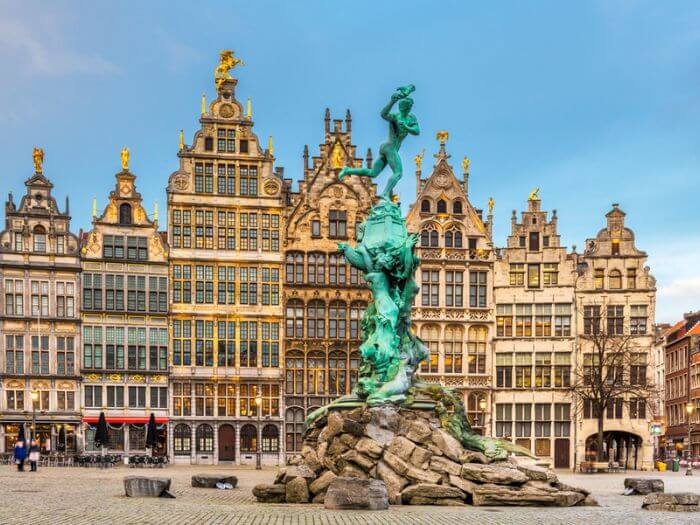
So Which Language Should You Speak In Belgium?
The balancing act between the two main languages is clearly illustrated by the fact that the Belgian national football team speak English together to avoid giving preferential treatment to one language. And while in Belgium, you should also be aware of these sensibilities.
If you’re in the French part and can speak French, then that’s what you should use – and if you’re in the Dutch part and know Dutch, that’s also the language to go for.
Furthermore, if you know the standard version of one of these languages, practically everyone who speaks that language will understand you, regardless of the dialect they speak at home.
However, if you don’t speak the language of the region where you’re travelling, it’s better just to speak English.
You won’t gain any credit with locals for being able to speak the language of the other half of the country, so the best option is just to prioritise communication.
The one grey area is Brussels where both languages are heard. In Brussels, almost everybody speaks French, over half speak Dutch and nearly half also speak English.
So in Brussels, you can always start in French, and then simply try to find a common language to communicate in.
The best advice is to understand the nuances of the linguistic situation in Belgium, to try to establish the most convenient form of communication with whoever you’re speaking to and then to take it from there.
As for German, though, that’s unlikely to be much use to you anywhere in Belgium unless you happen to find yourself in the small southeastern corner where that language is heard!
What Language Do They Speak In Belgium? FAQ
What language is mostly spoken in Belgium?
Belgium has three official languages: Dutch, French, and German. Dutch is the most spoken language, primarily in Flanders (northern Belgium), while French is dominant in Wallonia (southern Belgium) and Brussels. A small region in the east speaks German.
Do they speak English in Belgium?
Yes, many Belgians speak English, especially in Brussels and major cities. While English is not an official language, it is widely taught in schools and used in business and tourism. However, fluency levels vary depending on the region.
How do you say hello in Belgium?
In Flanders (Dutch-speaking region), people say hallo or the informal hoi. In Wallonia (French-speaking region), they use bonjour. In the German-speaking region, hallo or guten tag is common.
Do all Belgians speak 3 languages?
Not all Belgians speak all three official languages fluently. Most people in Flanders speak Dutch and often English or French. In Wallonia, French is dominant, with some knowledge of Dutch or English. Only a small minority in eastern Belgium speaks German fluently.
A Complicated Linguistic Situation But Not To Worry
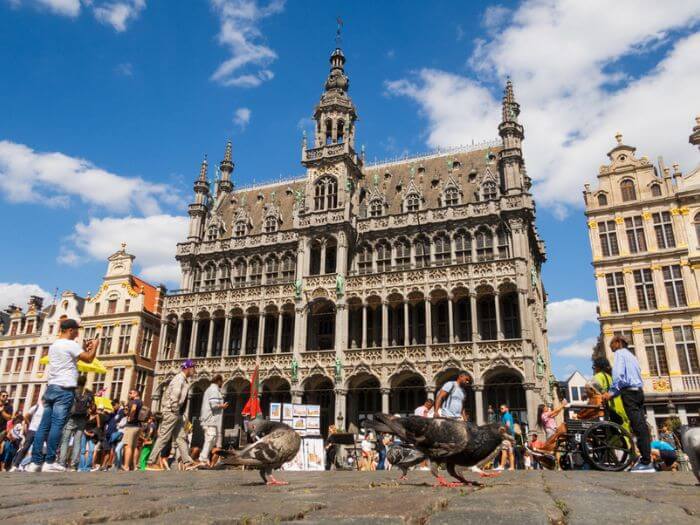
As we’ve seen, the linguistic situation in Belgium is much more complicated than in many other places.
Language plays an important role in the identity of Belgians, and finding a balance between the two main languages is a significant political issue in the country.
However, as a visitor to Belgium, you don’t need to worry about it unduly. Simply be aware that people speak different languages in the north and south. And try not to come across as an ignorant tourist by speaking the wrong language in the wrong place.
Other than that, people are unlikely to get angry with you for making any linguistic missteps – especially if you are always polite and keep a smile on your face!

Olly Richards
Creator of the StoryLearning® Method
Olly Richards is a renowned polyglot and language learning expert with over 15 years of experience teaching millions through his innovative StoryLearning® method. He is the creator of StoryLearning, one of the world's largest language learning blogs with 500,000+ monthly readers.
Olly has authored 30+ language learning books and courses, including the bestselling "Short Stories" series published by Teach Yourself.
When not developing new teaching methods, Richards practices what he preaches—he speaks 8 languages fluently and continues learning new ones through his own methodology.










































